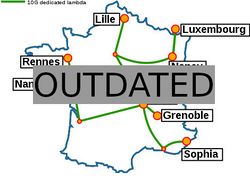Grid5000:Home: Difference between revisions
No edit summary |
No edit summary |
||
| Line 7: | Line 7: | ||
Key features: | Key features: | ||
* provides '''access to a large amount of resources''': 15000 cores, 800 compute-nodes grouped in homogeneous clusters, and featuring various technologies: GPU, SSD, NVMe, 10G and 25G Ethernet, Infiniband, Omni-Path | * provides '''access to a large amount of resources''': 15000 cores, 800 compute-nodes grouped in homogeneous clusters, and featuring various technologies: PMEM, GPU, SSD, NVMe, 10G and 25G Ethernet, Infiniband, Omni-Path | ||
* '''highly reconfigurable and controllable''': researchers can experiment with a fully customized software stack thanks to bare-metal deployment features, and can isolate their experiment at the networking layer | * '''highly reconfigurable and controllable''': researchers can experiment with a fully customized software stack thanks to bare-metal deployment features, and can isolate their experiment at the networking layer | ||
* '''advanced monitoring and measurement features for traces collection of networking and power consumption''', providing a deep understanding of experiments | * '''advanced monitoring and measurement features for traces collection of networking and power consumption''', providing a deep understanding of experiments | ||
Revision as of 23:57, 11 February 2020
|
Grid'5000 is a large-scale and flexible testbed for experiment-driven research in all areas of computer science, with a focus on parallel and distributed computing including Cloud, HPC and Big Data and AI. Key features:
Grid'5000 is merging with FIT to build the SILECS Infrastructure for Large-scale Experimental Computer Science. Read an Introduction to SILECS (April 2018)
Older documents:
|
Random pick of publications
Five random publications that benefited from Grid'5000 (at least 2937 overall):
- Dorian Goepp, Fernando Ayats Llamas, Olivier Richard, Quentin Guilloteau. ACM REP24 Tutorial: Reproducible distributed environments with NixOS Compose. 2024, pp.1-3. hal-04613983 view on HAL pdf
- François Lemaire, Louis Roussel. Parameter Estimation with Integral Elimination. Differential Algebra and Related Topics XII, Apr 2024, Kassel, Germany. . hal-04576171 view on HAL pdf
- Guillaume Helbecque, Ezhilmathi Krishnasamy, Nouredine Melab, Pascal Bouvry. GPU-Accelerated Tree-Search in Chapel versus CUDA and HIP. 14th IEEE Workshop Parallel / Distributed Combinatorics and Optimization (PDCO 2024), May 2024, San Francisco, United States. 10.1109/IPDPSW63119.2024.00156. hal-04551856 view on HAL pdf
- Reda Khoufache, Anisse Belhadj, Hanene Azzag, Mustapha Lebbah. Distributed MCMC inference for Bayesian Non-Parametric Latent Block Model. Pacific-Asia Conference on Knowledge Discovery and Data Mining (PAKDD), May 2024, Taipei, Taiwan. hal-04457575 view on HAL pdf
- Dorian Goepp, Samuel Brun, Quentin Guilloteau, Olivier Richard. Un prototype de cache de métadonnées pour le passage à l'échelle de NixOS-Compose. COMPAS 2024 - Conférence francophone d'informatique en Parallélisme, Architecture et Système, Jul 2024, Nantes, France. pp.1-8. hal-04632952 view on HAL pdf
Latest news
Failed to load RSS feed from https://www.grid5000.fr/mediawiki/index.php?title=News&action=feed&feed=atom: Error parsing XML for RSS
Grid'5000 sites
Current funding
As from June 2008, Inria is the main contributor to Grid'5000 funding.
INRIA |
CNRS |
UniversitiesUniversité Grenoble Alpes, Grenoble INP |
Regional councilsAquitaine |


